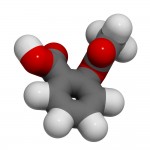
There is an increasing body of research that suggests that inflammation plays an important role in the development of schizophrenia. It is therefore logical to consider using anti-inflammatory drugs as a component within the overall treatment approach for people with schizophrenia.
This new systematic review and meta-analysis carried out by researchers from the University Medical Center in Utrecht, summarises the efficacy of non-steroidal anti-inflammatory drugs (NSAIDs) to augment antipsychotic treatment to reduce schizophrenia symptom severity.
The authors conducted a thorough search for randomised controlled trials and found 5 small studies involving a total of 264 patients. Four of the studies investigated the NSAID celecoxib and the other looked at aspirin. The studies were short (5 weeks – 3 months) and the authors reported heterogeneity across the different trials.
Here’s what they found:
- The overall mean effect size of NSAIDs vs. placebo for reducing total symptom severity was 0.43 (95% CI 0.06 to 0.8, p=0.02)
- The mean overall effect size on positive symptom severity was 0.34 (95% CI 0.05 to 0.64, p=0.02)
- The mean overall effect size on negative symptom severity was 0.26 (95% CI 0.02 to 0.50, p=0.03)
The authors concluded:
These results suggest that NSAID augmentation could be a potentially useful strategy to reduce symptom severity in schizophrenia. As these are the first studies on a relatively new strategy and the included sample size is modest, these results should be interpreted with caution. However, augmentation with acetylsalicylic acid may have the additional benefit of reducing cardiac and cancer mortality in schizophrenia. We therefore believe that application of NSAIDs in schizophrenia deserves further investigation as augmentation of antipsychotic treatment and reducing comorbid somatic diseases.
It’s worth pointing out that the authors of this review highlighted the possibility of publication bias, as another review of NSAID augmentation found that two unpublished trials found no significant benefit of this treatment.
This is clearly an area that requires a significant number of further trials before any general conclusions can be drawn. It will be especially interesting to see research that focuses on the early stages of schizophrenia, as drug treatment in this early phase could potentially have a big impact on the overall course of the disease.
Link
Sommer IE, de Witte L, Begemann M, Kahn RS. Nonsteroidal anti-inflammatory drugs in schizophrenia: ready for practice or a good start? A meta-analysis. J Clin Psychiatry. 2012 Apr;73(4):414-9. Epub 2011 Dec 13. [Abstract]
